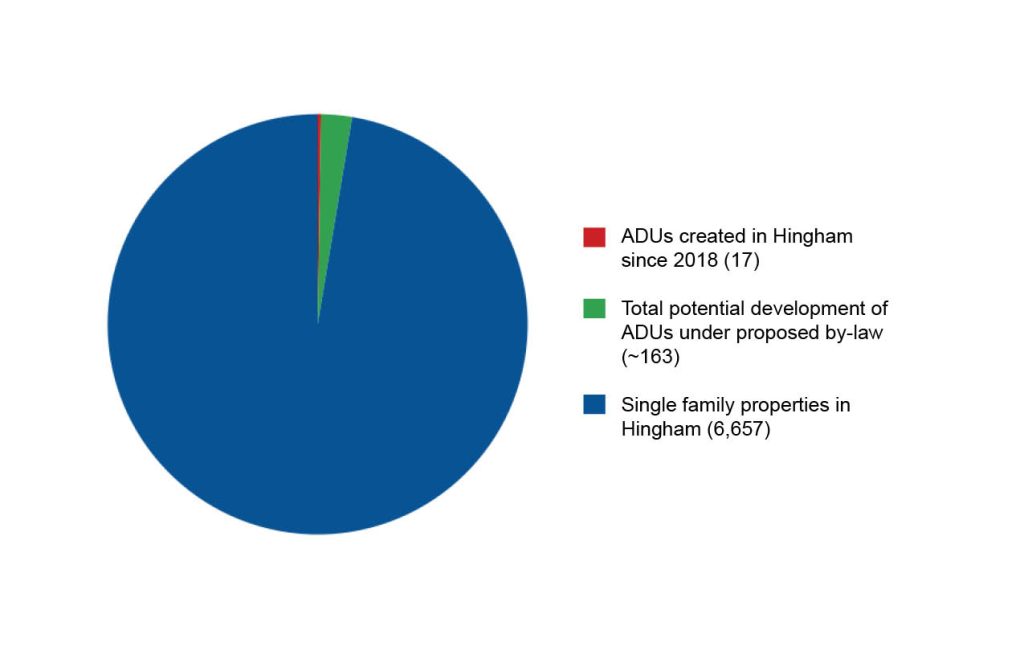
April 24, 2023 By Beth Rouleau
Please support Alternate Article 29 at Town Meeting to enact two key recommendations made by the Town appointed Accessory Dwelling Unit (ADU) Study Committee: 1) to allow a limited number of ADUs in detached structures; and 2) to eliminate the family restriction, allowing residents to decide who can live on their property. Please visit https://alternate29adu.org for more information.
I am writing to share my perspective on Alternate Article 29 as it relates to Hingham’s aging population. I have worked and volunteered in the field of gerontology during the last 10 years; was a member of the ADU Study Committee; former Chair of the Council on Aging; and current member of the Senior Center Building Committee. I have special interest in community planning that addresses housing needs across the lifespan and have followed policy trends related to the substantial re-emergence of ADUs, a vintage housing solution that you might recall from the past.
While ADUs are widely recognized among the AARP and other age friendly advocacy organizations as a housing solution for older adults, their benefits have impact for all ages. Increasingly, communities have not only allowed ADUs but are encouraging their development through financial and technical assistance programs. ADUs provide an opportunity to incorporate universal design features and can facilitate aging in place through the introduction of caregiver support, companionship, and shared property maintenance. ADUs can also be created for rental income, but this is not the sole purpose of an ADU.
In Hingham, the “family restriction” creates barriers for homeowners who are otherwise eligible, but do not have family (or a feasible opportunity to create a housing solution with family); and unrelated individuals who want to live in an ADU. Removal of the familial restriction fosters opportunities for non-family occupants and includes solo agers, friends, and new neighbors. While ADUs are a vintage solution, the first zoning ordinances didn’t define “family”. State courts are increasingly recognizing that the historic function of zoning does not hinge on regulations that restrict occupancy based on biological or legal relationships. Instead, zoning is a practice to “promote the health, safety, convenience, or general welfare of a community; whether individuals living in a household are related by kinship does not, on its own, affect the general welfare.” Communities are increasingly eliminating zoning codes that dictate who can live together based on exclusionary definitions of “family.”
Across the country, amidst a housing crisis, unprecedented demographic shifts are driving the need for smaller, less expensive housing options. In response, the Town of Hingham commissioned the Gerontology Institute at UMass Boston to conduct a Community Needs assessment in 2022. The report, Aging in Hingham, documents Hingham’s substantial and rapidly growing population of residents over age 60. By 2035, an estimated 39% of Hingham’s population will be over age 60. Within this demographic, there is a widening economic gap and increased risk of changes in health status or acquiring a disability. Mirroring a national trend recognized by the US Census Bureau, 34% of Hingham residents over age 65 live alone. For this growing cohort, that includes “solo agers”, consideration of health and housing related planning will be essential.
In response to evolving needs and housing preferences, Hingham is among many communities incrementally allowing ADUs. Since 2018, Hingham has allowed ADUs for use by family members and caregivers; an average of three ADUs per year have been permitted (also the average in other municipalities in Massachusetts). In 2021, Hingham updated its Master Plan and Housing Plan. Both plans highlight Hingham’s need to expand and diversify Hingham’s housing inventory. The 2021 Housing Plan noted that the 2018 bylaw was a step in the right direction, “however, restricting occupancy to family members largely sidesteps one of the primary purposes and benefits of such units – to provide homeowners with additional income that is particularly important for older homeowners, single parents, and others who are spending too much of their income on housing and for whom such income may be critical to remaining in their homes.”
During Town Meeting, 2023 there will be an opportunity to take a step beyond the ADU bylaw adopted in 2018. The number of ADUs allowed will continue to be restricted to 2.5% of Hingham’s single-family properties, approximately 160 units. In contrast to neighboring towns and states that have eliminated the family restriction and allow ADUs by right, Alternate Article 29 is an incremental, but necessary step to foster the development of ADUs in Hingham. Removal of the familial restriction advances community engagement around housing and informs future planning decisions. I hope you will join me in supporting this step and voting yes on Alternate Article 29.
With appreciation,
Beth Rouleau

